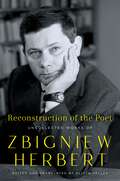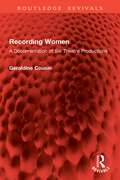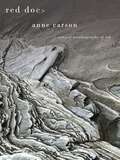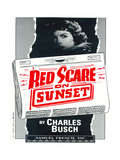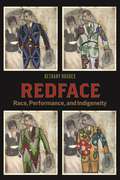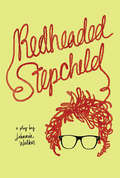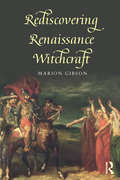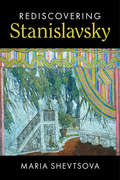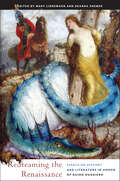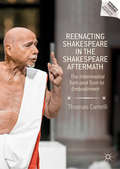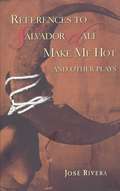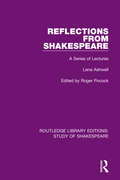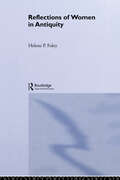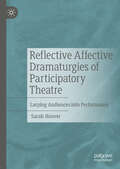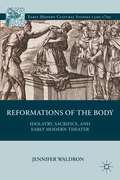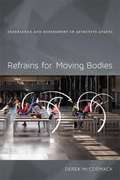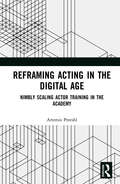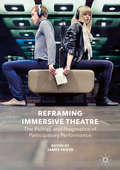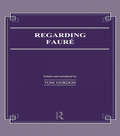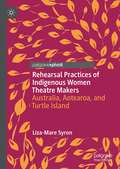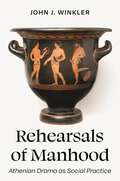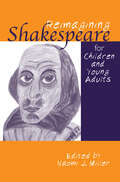- Table View
- List View
Reconstruction of the Poet: Uncollected Works of Zbigniew Herbert
by Zbigniew HerbertFrom one of Poland's most acclaimed poets comes a new collection of poems and plays spanning almost five decades and translated for the first time.Encapsulating the prolific work of the poet and playwright Zbigniew Herbert, Reconstruction of the Poet is both a celebration of a profound life of letters and a wide-ranging collection of never-before-published work that casts new light on a much-loved poet. Spanning from 1950 to 1998, this volume of work contains three plays—The Philosophers’ Cave, The Other Room, and Reconstruction of the Poet—and over fifty poems. This collection takes readers through the mind of a man attempting to look at the ruins of a postwar world while seeking living sources of European culture, with poems commemorating contemporaries fallen in wartime, elevating erotic experience and friendship, and exploring political and metaphysical passions.A rich expansion of previously published works by Herbert, Reconstruction of the Poet is both an introduction for readers who might still be unfamiliar with this important poet’s work and a fresh invitation for reflection for his longtime readers.
Recording Women: A Documentation of Six Theatre Productions (Routledge Revivals)
by Geraldine CousinFirst Published in 2000, Recording Women documents the work of three leading feminist theatre companies, Sphinx Theatre Company, Scarlett Theatre and Foresight Theatre, through a combination of interviews with theatre practitioners and detailed descriptions of productions in performance. Each of the six productions is innovative in content and style.Scarlett Theatre’s Paper Walls and Foresight Theatre’s Boadicea: The Red-Bellied Queen employ a skillful mixture of text, music, physical performance, humour and seriousness to explore, respectively, domestic abuse and rape (of women and community). Scarlett Theatre’s The Sisters and Sphinx’s Voyage in the Dark adapt existing texts. The sisters is a ritualized re-enactment of Chekhov’s Three Sisters in which only the female characters from the play appear. Voyage in the Dark uses film-noir-like theatrical effects and the insistent rhythms of the tango to evoke the rootlessness and sense of alienation that characterizes Jean Rhys’s novel. Slap (Foursight Theatre) and Goliath (Sphinx) are both one woman shows. Slap, performed by Naomi Cooke, explores images of motherhood, including lesbian motherhood and the concept of virgin birth. Goliath, performed by Nicola McAuliffe, is a dramatization, by Bryony Lavery, of Beatrix Campbell’s powerful study of the 1991 riots in Cardiff, Oxford and Tyneside. This is a must read for scholars and researchers of theatre studies.
Recreating Historic Dress: Clothing Gems from the Hereford Museum Clothing Collection, with Patterns
by Nancy E. HillsRecreating Historic Dress: Clothing Gems from the Hereford Museum Clothing Collection, with Patterns compiles patterns and information for 25 never-before-published garments from the historic clothing collection at the Hereford Museum and Art Gallery Resource Centre, Hereford, UK.An accurate study of dress is dependent on the very close and careful examination of existing garments. Nancy Hills has conducted a detailed analysis of a range of garments, spanning the years 1755 through to 1954, carefully exploring what they can tell us and translating them into paper patterns. Each featured garment contains a detailed description, the pattern, historical context, and images of the full article of clothing and construction details from inside the garment. This book features an eclectic selection of clothing, including a comfortable 18th-century cotton caraco often worn for work, leisure, travel, or pregnancy, a simple cotton print dress worn in 1834 as a wedding dress, and two dresses, one from 1936 and one from 1954, that show a more elite pedigree, with their labels of popular London designers.This book will be of interest to experienced costume designers and technicians, cutters and drapers, intermediate students of theatrical costume design, and historical reenactors.
Red Doc> (Vintage Contemporaries Ser.)
by Anne CarsonA literary event: a follow-up to the internationally acclaimed poetry bestseller Autobiography of Red ("Amazing" -- Alice Munro) that takes its mythic boy-hero into the twenty-first century to tell a story all its own of love, loss, and the power of memory. In a stunningly original mix of poetry, drama, and narrative, Anne Carson brings the red-winged Geryon from Autobiography of Red, now called "G," into manhood, and through the complex labyrinths of the modern age. We join him as he travels with his friend and lover "Sad" (short for Sad But Great), a haunted war veteran; and with Ida, an artist, across a geography that ranges from plains of glacial ice to idyllic green pastures; from a psychiatric clinic to the somber housewhere G's mother must face her death. Haunted by Proust, juxtaposing the hunger for flight with the longing for family and home, this deeply powerful verse picaresque invites readers on an extraordinary journey of intellect, imagination, and soul.
Red Scare On Sunset
by Charles BuschFull Length, Comedy \ 5 m, 3 f \ Unit set \ This Off-Broadway hit is set in 1950's Hollywood during the blacklist days. This is a hilarious comedy that touches on serious subjects by the author of Vampire Lesbians of Sodom. Mary Dale is a musical comedy star who discovers to her horror that her husband, her best friend, her director and houseboy are all mixed up in a communist plot to take over the movie industry. Among their goals is the dissolution of the star system! Mary's conversion from Rodeo Drive robot to McCarthy marauder who ultimately names names, including her husband's, makes for outrageous, thought provoking comedy. The climax is a wild dream sequence where Mary imagines she's Lady Godiva, the role in the musical she's currently filming. Both right and left are skewered in this comic melodrama. \ "You have to champion the ingenuity of Busch's writing which twirls twist upon twist and spins into comedy heaven."-Newsday
Red Sneaks
by Elizabeth SwadosTeen Groups \ Musical \ 4 m., 4 f. \ Unit set. \ This free wheeling contemporary musical for teens is a loose adaptation of the The Red Shoes, transposed to today's urban jungle. The allegorical montage of songs, scenes and monologues centers around a welfare hotel resident who is persuaded by a mysterious young drifter to accept a pair of glittery red sneakers. Whoever is wearing them may wish for anything-- and every wish comes true, but the easy way out turns out to be a fast trip to an early death. \ "The most refreshing thing about The Red Sneaks ... is the chance to hear youths rather than adults talk about the nightmarish pressures of urban life." - The New York Times
Redeeming the Reclusive Earl: A Steamy Historical Romance
by Virginia HeathAn annoyance to lovers, opposites attract Regency romp! His heart is a fortress And she&’s trespassing! After losing all he holds dear in a horrific fire, Max Aldersley, Earl of Rivenhall, shuns the world—until he catches Effie Nithercott digging holes on his estate! He banishes the intrepid archaeologist and the unsettled feelings she arouses within him. But she returns, even more determined and infuriatingly desirable than before! He wonders just how deep she is prepared to dig—so far that she&’ll reach the man beneath his scars…? Previously published Look out for Virginia Heath&’s latest Harlequin Historical, part of A Season to Wed: Only an Heiress Will Do by Virginia Heath The Viscount&’s Forbidden Flirtation by Sarah Rodi Their Second Chance Season by Ella Matthews The Lord&’s Maddening Miss by Lucy Morris
Redface: Race, Performance, and Indigeneity (Performance and American Cultures)
by Bethany HughesConsiders the character of the “Stage Indian” in American theater and its racial and political impact Redface unearths the history of the theatrical phenomenon of redface in nineteenth- and twentieth-century America. Like blackface, redface was used to racialize Indigenous peoples and nations, and even more crucially, exclude them from full citizenship in the United States. Arguing that redface is more than just the costumes or makeup an actor wears, Bethany Hughes contends that it is a collaborative, curatorial process through which artists and audiences make certain bodies legible as “Indian.” By chronicling how performances and definitions of redface rely upon legibility and delineations of race that are culturally constructed and routinely shifting, this book offers an understanding of how redface works to naturalize a very particular version of history and, in doing so, mask its own performativity.Tracing the “Stage Indian” from its early nineteenth-century roots to its proliferation across theatrical entertainment forms and turn of the twenty-first century attempts to address its racist legacy, Redface uses case studies in law and civic life to understand its offstage impact. Hughes connects extensive scholarship on the “Indian” in American culture to the theatrical history of racial impersonation and critiques of settler colonialism, demonstrating redface’s high stakes for Indigenous and non-Indigenous alike. Revealing the persistence of redface and the challenges of fixing it, Redface closes by offering readers an embodied rehearsal of what it would mean to read not for the “Indian” but for Indigenous theater and performance as it has always existed in the US.
Redheaded Stepchild
by Johnnie WalkerNicholas is a twelve-year-old with red hair whose dad just remarried. This makes Nicholas a redheaded stepchild. Literally. And tomorrow at lunch, the biggest boy in grade six plans to beat him up—he even made a Facebook event about it. Should Nicholas skip school? His new stepmom, a chain-smoking, ex-Jehovah’s Witness golf pro named Mary-Anne, doesn’t want him playing hooky. His secret alter ego, the fabulous and charismatic Rufus Vermilion, thinks his ginger genetics will doom him either way. But when events in the schoolyard leave both Mary-Anne and Rufus speechless, it’s up to Nicholas to pick up the pieces and do some serious growing up.
Rediscovering Renaissance Witchcraft
by Marion GibsonRediscovering Renaissance Witchcraft is an exploration of witchcraft in the literature of Britain and America from the 16th and 17th centuries through to the present day. As well as the themes of history and literature (politics and war, genre and intertextuality), the book considers issues of national identity, gender and sexuality, race and empire, and more. The complex fascination with witchcraft through the ages is investigated, and the importance of witches in the real world and in fiction is analysed. The book begins with a chapter dedicated to the stories and records of witchcraft in the Renaissance and up until the English Civil War, such as the North Berwick witches and the work of the ‘Witch Finder Generall’ Matthew Hopkins. The significance of these accounts in shaping future literature is then presented through the examination of extracts from key texts, such as Shakespeare’s Macbeth and Middleton’s The Witch, among others. In the second half of the book, the focus shifts to a consideration of the Romantic rediscovery of Renaissance witchcraft in the eighteenth century, and its further reinvention and continued presence throughout the nineteenth, twentieth and twenty-first centuries, including the establishment of witchcraft studies as a subject in its own right, the impact of the First World War and end of the British Empire on witchcraft fiction, the legacy of the North Berwick, Hopkins and Salem witch trials, and the position of witchcraft in culture, including filmic and televisual culture, today. Equipped with an extensive list of primary and secondary sources, Rediscovering Renaissance Witchcraft is essential reading for all students of witchcraft in modern British and American culture and early modern history and literature.
Rediscovering Stanislavsky
by Maria ShevtsovaKonstantin Stanislavsky (1863–1938) was one of the most innovative and influential directors of modern theatre and his system and related practices continue to be studied and used by actors, directors and students. Maria Shevtsova sheds new light on the extraordinary life of Stanislavsky, uncovering and translating Russian archival sources, rehearsal transcripts, production scores and plans. This comprehensive study rediscovers little-known areas of Stanislavsky's new type of theatre and its immersion in the visual arts, dance and opera. It demonstrates the fundamental importance of his Russian Orthodoxy to the worldview that underpinned his integrated System and his goals for the six laboratory research studios that he established or mentored. Stanislavsky's massive achievements are explored in the intricate and historically intertwined political, cultural and theatre contexts of Tsarist Russia, the 1917 Revolution, the volatile 1920s, and Stalin's 1930s. Rediscovering Stanislavksy provides a completely fresh perspective on his work and legacy.
Redreaming the Renaissance: Essays on History and Literature in Honor of Guido Ruggiero (The Early Modern Exchange)
by Albert Russell Ascoli Paula Findlen Joanne M. Ferraro Nicholas Terpstra Suzanne Magnanini Konrad Eisenbichler Courtney Quaintance Meredith K. Ray Alessandro Arcangeli Massimo Rospocher Julia L. Hairston Douglas G. BiowRedreaming the Renaissance seeks to remedy the dearth of conversations between scholars of history and literary studies by building on the pathbreaking work of Guido Ruggiero to explore the cross-fertilization between these two disciplines, using the textual world of the Italian Renaissance as proving ground. In this volume, these disciplines blur, as they did for early moderns, who did not always distinguish between the historical and literary significance of the texts they read and produced. Literature here is broadly conceived to include not only belles lettres, but also other forms of artful writing that flourished in the period, including philosophical writings on dreams and prophecy; life-writing; religious debates; menu descriptions and other food writing; diaries, news reports, ballads, and protest songs; and scientific discussions. The twelve essays in this collection examine the role that the volume’s dedicatee has played in bringing the disciplines of history and literary studies into provocative conversation, as well as the methodology needed to sustain and enrich this conversation.
Reenacting Shakespeare in the Shakespeare Aftermath: The Intermedial Turn and Turn to Embodiment (Reproducing Shakespeare)
by Thomas CartelliIn the Shakespeare aftermath—where all things Shakespearean are available for reassembly and reenactment—experimental transactions with Shakespeare become consequential events in their own right, informed by technologies of performance and display that defy conventional staging and filmic practices. Reenactment signifies here both an undoing and a redoing, above all a doing differently of what otherwise continues to be enacted as the same. Rooted in the modernist avant-garde, this revisionary approach to models of the past is advanced by theater artists and filmmakers whose number includes Romeo Castellucci, Annie Dorsen, Peter Greenaway, Thomas Ostermeier, Ivo van Hove, and New York’s Wooster Group, among others. Although the intermedial turn taken by such artists heralds a virtual future, this book demonstrates that embodiment—in more diverse forms than ever before—continues to exert expressive force in Shakespearean reproduction’s turning world.
References to Salvador Dalí Make Me Hot and Other
by José RiveraSurrealism, magic realism and expressionism are the hallmarks of Jose Rivera's influential body of work. This new volume collects the author's plays written in the past five years, including References to Salvador Dalí Make Me Hot ("effortlessly melds otherworldly fantasy with gritty realism to make sparks fly onstage."--The Journal News), Sueño (a reworking for Pedro Calderón's Life is a Dream) and Sonnets for an Old Century, the author's most recent work, which recently premiered in Los Angeles.Puerto Rican-born playwright José Rivera plays have been produced all over the world and his work has been translated into seven languages. His best known work includes Marisol and Each Day Dies with Sleep. "Rivera has a messianic mission to replace old and dying creeds with vibrant new visions."--Robert Brustein, New RepublicAlso available by José Rivera Marisol and Other Plays PB $15.95 1-55936-136-0 * USA
Reflections From Shakespeare: A Series of Lectures (Routledge Library Editions: Study of Shakespeare)
by Lena AshwellOriginally published in 1926, this title was edited from a series of lectures the author gave to raise money for her theatre group the Lena Ashwell Players. Through her work as a producer the author gained a deeper knowledge of a number of Shakespeare’s plays and in order to support her work gave a number of lectures on "Women in Shakespeare". This title was perhaps the first book by a woman of the profession, appealing to the public for a larger and deeper understanding of Shakespeare: the man, his life, and that group of tragedies in which he fathomed Hell, then scaled the Heavens.
Reflections of Women in Antiquity
by Helene P. FoleyPublished in the year 1981, Reflections of Women in Antiquity is a valuable contribution to the field of Performance.
Reflective Affective Dramaturgies of Participatory Theatre: Larping Audiences into Performance
by Sarah HooverAs the popularity and diversity of participatory theatre productions increase, scholarly and artistic attention toward the audience as agentive contributors and interpreters must keep pace. Simultaneously, the COVID-19 pandemic has added urgency to the collective artistic encounter and its value to individual and community health. This book proposes “reflective affective” dramaturgies of participatory theatre aimed toward incorporating participants’ reflections and affective responses as material in an emergent exploration of represented systems of power. The volume's interdisciplinary theoretical frameworks stem from performance studies discourses including feminist materialism, phenomenology and affect theory, bringing them together with larp scholarship on character/self performance, agency and emergence. Through its integration of the practical and theoretical, this work serves as an essential study for scholars, students and artists in theatre studies, performance studies, visual art studies, role-play studies, cultural studies, and philosophy.
Reformations Of The Body
by Jennifer WaldronThis project takes the human body and the bodily senses as joints that articulate new kinds of connections between church and theatre and overturns a longstanding notion about theatrical phenomenology in this period.
Refrains for Moving Bodies: Experience and Experiment in Affective Spaces
by Derek P. MccormackIn Refrains for Moving Bodies, Derek P. McCormack explores the kinds of experiments with experience that can take place in the affective spaces generated when bodies move. Drawing out new connections between thinkers including Henri Lefebvre, William James, John Dewey, Gregory Bateson, Félix Guattari, and Gilles Deleuze, McCormack argues for a critically affirmative experimentalism responsive to the opportunities such spaces provide for rethinking and remaking maps of experience. Foregrounding the rhythmic and atmospheric qualities of these spaces, he demonstrates the particular value of Deleuze and Guattari's concept of the "refrain" for thinking and diagramming affect, bodies, and space-times together in creative ways, putting this concept to work to animate empirical encounters with practices and technologies as varied as dance therapy, choreography, radio sports commentary, and music video. What emerges are geographies of experimental participation that perform and disclose inventive ways of thinking within the myriad spaces where the affective capacities of bodies are modulated through moving.
Reframing Acting in the Digital Age: Nimbly Scaling Actor Training in the Academy
by Artemis PreeshlReframing Acting in the Digital Age: Nimbly Scaling Actor Training in the Academy refocuses how actors work in TV, film, and stage. In this refreshing text, Preeshl integrates original interviews with 25 theatre, film, TV, and digital media experts from leading international programs to create an essential contribution to actor training studies. These interviews cover diverse topics such as contemporary training methods, industry standards, and experiential learning, incorporating interdisciplinary recommendations from academics and professionals alike to navigate undergraduate actor training in the digital age. Digitally native undergraduates arrive at university being well versed in the digital and technological world, but as technologically savvy as these Millenials and Generation Z are, Preeshl and her interviewees show how acting and production degree programs can reframe these competencies to enable students to acquire and transfer digital skills. This phenomenological study bridges actor training methods across media to promote 'scaling' to update undergraduate actor training for the digital age. By applying the recommendations of these experts to curricular practices, universities may increase market share, diversity, and graduate employability. This in-depth field study is a vital read for acting teachers, students, professional actors, and scholars within theatre and film programs.
Reframing Immersive Theatre
by James FriezeThis diverse collection of essays and testimonies challenges critical orthodoxies about the twenty-first century boom in immersive theatre and performance. A culturally and institutionally eclectic range of producers and critics comprehensively reconsider the term 'immersive' and the practices it has been used to describe. Applying ecological, phenomenological and political ideas to both renowned and lesser-known performances, contributing scholars and artists offers fresh ideas on the ethics and practicalities of participatory performance. These ideas interrogate claims that have frequently been made by producers and by critics that participatory performance extends engagement. These claims are interrogated across nine dimensions of engagement: bodily, technological, spatial, temporal, spiritual, performative, pedagogical, textual, social. Enquiry is focussed along the following seams of analysis: the participant as co-designer; the challenges facing the facilitator of immersive/participatory performance; the challenges facing the critic of immersive/participatory performance; how and why immersion troubles boundaries between the material and the magical.
Regarding Faure (Musicology)
by Tom GordonRegarding Fauré , the result of a 1995 conference on Fauré's important contribution to classical music, was written by Tom Gordon, artistic director the Ensemble Musica Nova and a professor in the Department of music at Bishop's University in Quebec. Also included are contributions from some of the world's most renowned Fauré scholars including Jean-Michel Nectous, Robert Orledge, Edward Phillips, and Steven Huebner. With a lifetime that spanned the developments of Chopin, Debussy, Schoenberg, and Stravinsky, the great French composer Gabriel-Urbain Fauré (1845-1924) lived during one of the most interesting periods in music history, yet steered a course uniquely his own. Exploring the composer's role as an educator, critic, composer, and advocate for French music, Regarding Fauré is critical, analytical, and interdisciplinary in its approach to understanding Fauré's prodigious works and life. Also includes musical examples. His numerous compositions include more than 100 songs (known as 'melodie', or French a
Rehearsal Practices of Indigenous Women Theatre Makers: Australia, Aotearoa, and Turtle Island
by Liza-Mare SyronThis transnational and transcultural study intimately investigates the theatre making practices of Indigenous women playwrights from Australia, Aotearoa, and Turtle Island. It offers a new perspective in Performance Studies employing an Indigenous standpoint, specifically an Indigenous woman’s standpoint to privilege the practices and knowledges of Maori, First Nations, and Aboriginal women playwrights. Written in the style of ethnographic narrative the author affords the reader a ringside seat in providing personal insights on the process of negotiating access to rehearsals in each specific cultural context, detailed descriptions of each rehearsal location, and describing the visceral experiences of observing Indigenous theatre makers from inside the rehearsal room. The Indigenous scholar and theatre maker draws on Rehearsal Studies as an approach to documenting the day-to-day working practices of Indigenous theatre makers and considers an Indigenous Standpoint as a valid framework for investigating contemporary Indigenous theatre practices in a colonised context.
Rehearsals of Manhood: Athenian Drama as Social Practice
by John J. WinklerA bold reconception of ancient Greek drama by one of the most brilliant and original classical scholars of his generationWhen John Winkler died in 1990, he left an unpublished manuscript containing a highly original interpretation of the development and meaning of ancient Greek drama. Rehearsals of Manhood makes this groundbreaking work available for the first time, presenting an entirely novel picture of Greek tragedy and a vivid portrait of the cultural poetics of Athenian manhood.Ancient Athens was a military conclave as well as an urban capital, and male citizens were expected to embody the ideal of the Athenian citizen-soldier. Winkler understands Attic drama as a secular manhood ritual, a collaborative aesthetic and civic enterprise focused on the initiation of boys into manhood and the training, testing, and representation of young male warriors. Past efforts to discover the origins and development of Greek tragedy have largely treated drama as a literary genre, isolating it from other Athenian social practices. Winkler returns Greek tragedy to its social context, showing how it was one among many forms of display and performance cultivated by elite males in ancient Greece.The final work of a celebrated classical scholar, Rehearsals of Manhood highlights the civic function of the dramatic festivals at classical Athens as occasions for the examination and representation of boys on the verge of manhood, and offers a fresh explanation of how dramatic performance fit into the social life and gender politics of the Athenian state.
Reimagining Shakespeare for Children and Young Adults (Children's Literature and Culture)
by Naomi MillerFirst published in 2003. Routledge is an imprint of Taylor & Francis, an informa company.
